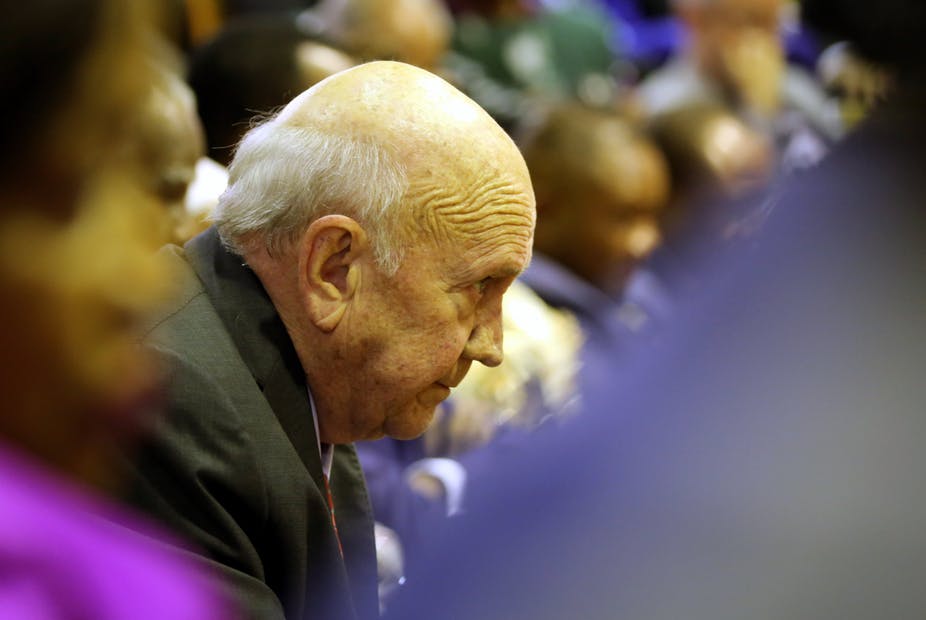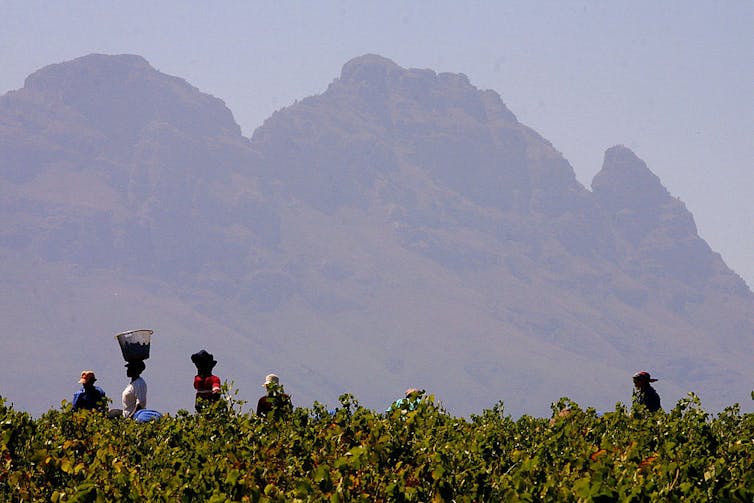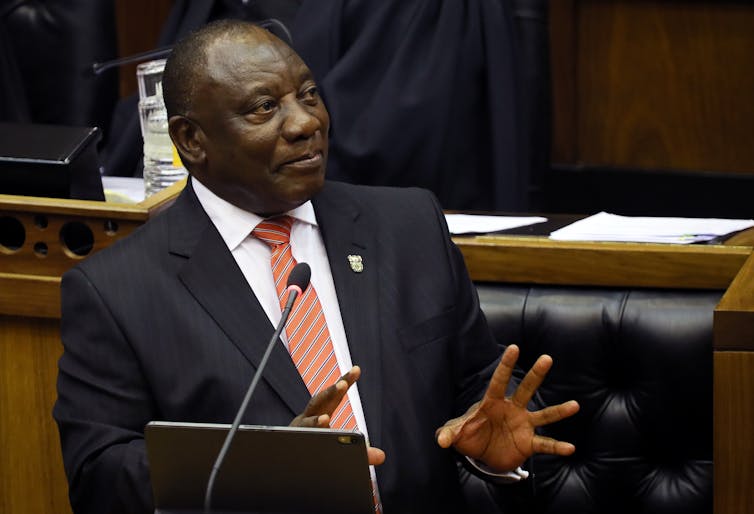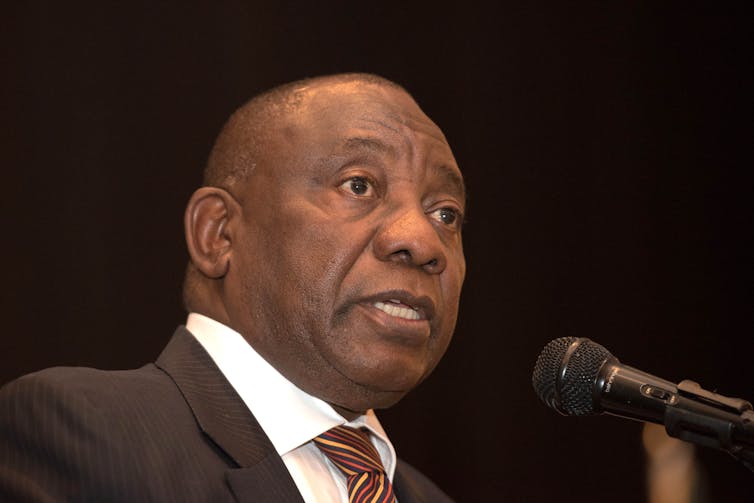
Former South African President FW De Klerk at the opening of parliament recently. The Economic Freedom Fighters objected to his presence. EFE-EPA/Reuters Pool
By Roger Southall, University of the Witwatersrand
FW De Klerk, South Africa’s last apartheid-era president, and his foundation have learnt the hard way the dangers of the comparative politics of sin.
He recently gave an interview to mark his historic speech to parliament on 2 February 1990 when he announced the freeing of Nelson Mandela and unbanning of political organisations.
During the interview on the national TV broadcaster, when he was asked for his thoughts on the declaration by the United Nations that apartheid was a crime against humanity, he replied:
I don’t fully agree with that.
He went on to assert that he was not justifying apartheid in any way whatsoever, saying:
But there is a difference between calling something a crime. Like genocide is a crime. Apartheid cannot be, for instance, compared with genocide. There was never a genocide.
He added that more black people were killed by other black people than by the National Party government.
But in making this statement he conveniently chose to forget that a great deal of violence was fomented by the government’s security forces.
De Klerk was immediately engulfed in controversy.
Condemnation of his statement came in thick and fast. Big names entered the fray, including former president Thabo Mbeki and Anglican Archbishop Emeritus Desmond Tutu.
The South African Council of Churches issued a statement, as did the governing African National Congress (ANC).
And the opposition party, the Economic Freedom Fighters, called for his ejection from parliament when President Cyril Ramaphosa was waiting to deliver his State of Nation speech.
De Klerk’s foundation responded by dismissing the UN’s statement as a product of Soviet-style ‘agitprop’.
This aroused yet more popular fury. Such was the outcry that De Klerk opted for an immediate and humiliating retreat, issuing an abject apology, and insisting that he remained firmly committed to the politics of national reconciliation.
His foundation also backtracked. It issued an apology for any anger and hurt caused. In its statement, it said it agreed with the International Criminal Court’s definition of a crime against humanity as acts:
committed as part of a widespread or systematic attack directed against any civilian population, with knowledge of the attack.
But it’s unlikely the incident has brought about a sea-change in De Klerk’s personal beliefs, or the political assumptions that guide his foundation.
Indeed, it is not unlikely that his twin beliefs – that apartheid was not a crime against humanity and that apartheid cannot be equated with genocide – are shared by many white South Africans, even though they are rarely so incautiously stated in public.
This is why it’s important to take a little time to challenge them. Let’s start with the issue of apartheid’s killings not amounting to genocide. If the body count is the only criterion for mass killings to qualify as genocide, then it has to be acknowledged that there is truth in De Klerk’s statement.
The thousands killed under apartheid cannot reasonably be compared to the millions systematically exterminated by, most notoriously, the Nazis during the Holocaust of European Jews between 1941 and 1945.
But is the argument that “we weren’t so bad as the Nazis” really one with which De Klerk really wants to be associated? Can that be regarded as a moral defence, especially if we recall that apartheid was implemented in the wake of World War II, following the revelation of the horrors that had taken place in the Nazi death camps in the name of racial supremacy?
It is, in any event, of no great comfort to people suffering from brutality of any kind to be told that there is always someone else who is suffering worse than them.
Now to the question of the description of apartheid as a crime against humanity.
De Klerk might well respond that his National Party implemented apartheid in good faith in 1948, believing it to be a moral course of action whereby the white minority and black majority could live peacefully and productively alongside one another, without either one dominating the other.
He might back this up by adding that this benevolent view of apartheid was shared and propagated by the Dutch Reformed Churches and that the National Party of the time was confident it was pursuing a genuinely Christian policy.
But De Klerk would also need to engage with the fact that this position was challenged by such outstanding individuals as the anti-apartheid theologian and fellow Afrikaner Beyers Naude. And, the Dutch Reformed Church belatedly confessed that apartheid was a sin.
Despite all these qualifications, it seems that De Klerk continues to find it hard to accept that apartheid was a crime against humanity.
But, the position that apartheid was a crime against humanity was established and pursued by the UN because, first, apartheid entrenched racial superiority and inferiority, and second, it systematically enforced the inferiority and oppression of black South Africans through law.
Questions for philosophers and historians
It is also now well established, even if De Klerk professes not to have known about the atrocities committed by apartheid security forces at the time, that these were a systematic accompaniment of apartheid law, and that in any case, the law was broken by the regime’s operatives if and when they found it convenient to do so.
It was not legal to torture people in detention. But the state did just that, resulting in the deaths of hundreds.
Among them were the trade unionist Neil Aggett, activist Ahmed Timol and black consciousness movement leader Steve Biko.
De Klerk should accept that doubting the criminality of apartheid is an insult to their memories and their families.
He has apologised for causing hurt and offence to South Africans. Let us accept that this apology was genuine.
Nonetheless, we are left with the impression that the former president remains insensitive to the feelings of the mass of South Africans.
He is simply out of touch.
If he learns nothing else from this incident, it is that he should leave assessments of the moral qualities of apartheid to the philosophers and historians – and shut up.
Roger Southall is Professor of Sociology, University of the Witwatersrand
This article is republished from The Conversation under a Creative Commons license.
Enjoy this article? Subscribe for free to ZA Confidential to receive our newsletters: Click here. Twitter: @zaconfidential









